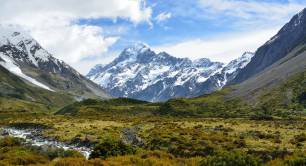Universities down under come out on top in 2020 social impact rankings
New Zealand’s University of Auckland has once again topped a ranking of the world's most sustainable higher education institutions.
The second annual edition of the Times Higher Education Impact Rankings, published on Wednesday, looked at data from 766 universities in 85 countries. It is the only global performance table to assess universities against the United Nations’ Sustainable Development Goals, and looks at three broad areas of university activity: research, outreach and stewardship. The ranking claims to help measure 'the real impact that universities are making on their students and wider communities', by assessing universities' social and economic impact using metrics based on the SDGs.
Places two, three and four are held by three Australian universities: University of Sydney, Western Sydney University and La Trobe University in Melbourne. Last year, there were no Australian universities in the overall top 10.
Two British universities make it into the top 10: the University of Manchester (8th) and King’s College London (9th).
Long-held priorities
As nations, Australia and New Zealand are already well-placed on the global social impact map. The former was last year named the second-best country worldwide for social entrepreneurs, while the latter hosted the 2017 Social Enterprise World Forum.
Auckland University is New Zealand’s largest and most comprehensive, with six main campuses and 42,000 students, including 8,000 international students.
Vice-chancellor Professor Dawn Freshwater said in a statement that the ranking’s focus on sustainability had become “even more relevant as we consider what a post-Covid world might look like, and how this enforced ‘pause’ might be used as an opportunity to reshape economies in more sustainable ways.”
Sustainability has become even more relevant as we consider what a post-Covid world might look like
The New Zealand institution’s top ranking was driven by strong scores for life on land (SDG 15), life below water (SDG 14) and health and wellbeing (SDG 3) – areas that Freshwater said have long been priorities because of its location and its mission as a research-led university.
“Our physical proximity to the sea coast results in unique marine projects and our national commitment to sustainability and environmentalism is also reflected in our research activity and our practices,” she told Times Higher Education.
“Examples include our work with local iwi [a Māori tribe], councils and communities around freshwater management, our Institute of Marine Science that provides aquaculture awareness raising activities for anyone interested in New Zealand’s marine environment and our Marine Mammal Ecology Group monitoring the health of aquatic ecosystems through the ‘Pulse of the Gulf’ project. On land, we own and manage a number of biodiversity reserves including native forest, wetland, and coastal ecosystems.”
Global outlook
John Thwaites, chair of Monash University’s Sustainable Development Institute and of Australia’s National Sustainable Development Council, said the SDGs were considered “a really important framework” for many universities in the region, while Australian and New Zealand universities also have a “strong global outlook”.
Our success as universities…is very much linked to the sustainable development of our neighbours in Asia and the Pacific
“We have many international students, but we’re also living in developed countries that are surrounded by developing neighbours,” Thwaites said. “And so our success as universities and our countries’ success is very much linked to the sustainable development of our neighbours in Asia and the Pacific.”
Cameron Allen, an international sustainable development expert and PhD researcher at UNSW Sydney, said many institutions in Australia have led the globe in establishing multidisciplinary thematic research or sustainable development institutes. Initiatives such as those led by Australia’s national science research agency (CSIRO) have also increased awareness of the SDGs among the researchers and academia.
Header photo: University of Auckland Clock Tower.
Thanks for reading our stories. As somebody working in the impact economy, you'll know that producing quality work doesn't come free. We rely on paid subscriptions and partnerships to sustain our purpose-led journalism – so if you think it's worth having an independent, specialist media platform to share your news, insight and debate across the globe, please consider subscribing. You'll also be buying social: Pioneers Post is a social enterprise itself, reinvesting all profits to help you do good business, better.




![[file:field_file_image_alt_text]](https://www.pioneerspost.com/sites/default/files/styles/node-teaser/public/images/article/uni2.jpg?itok=CXAr4pHe)